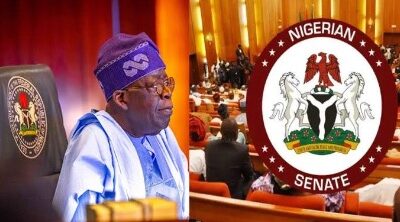Tech
Why Youth Entrepreneurs Are Key To Tackling Climate Change in Africa By Tony Elumelu
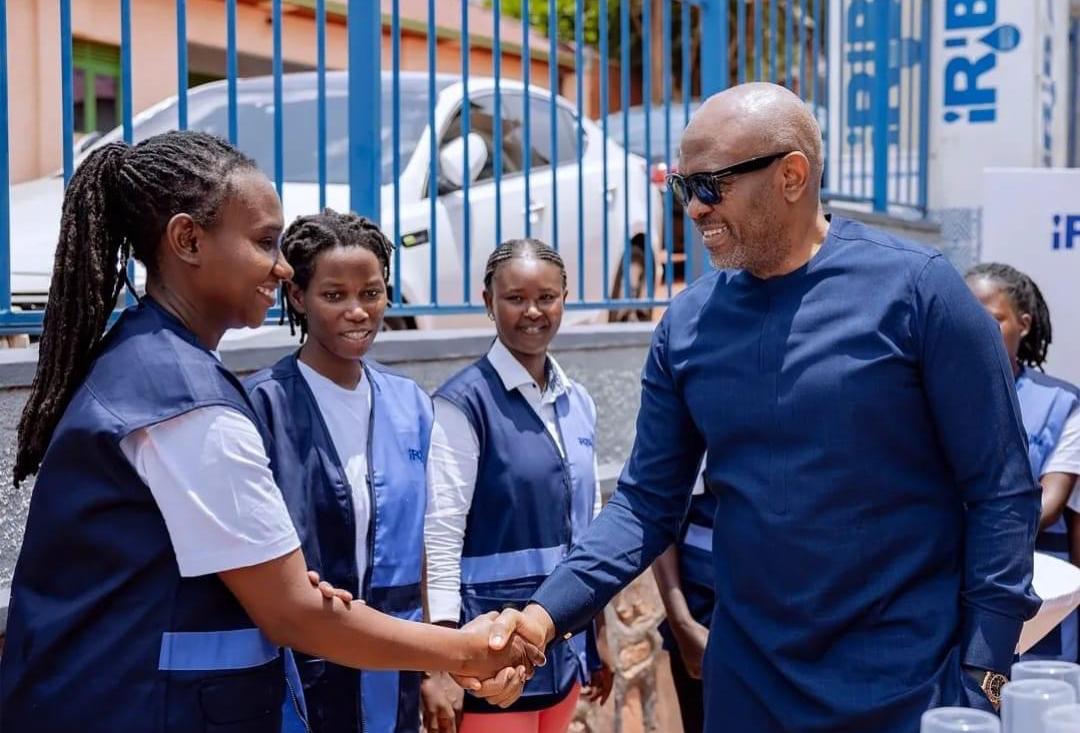
I am a proud Nigerian and a proud African. I am also a philanthropist and entrepreneur—and I have seen firsthand that to effectively tackle climate change within the African context, from Egypt to Nigeria to South Africa, we must look to the people it impacts.
Too often our businesses have not created value on our continent or traded commodities for short-term profit, not long-term investment. Fostering entrepreneurship, sustaining young entrepreneurs, who will grow businesses and create sustainable employment, is a crucial pathway to achieving long-term climate solutions.
In 2010, my wife and I had an idea. Concerned with escalating poverty, we founded the Tony Elumelu Foundation (TEF) and committed $100 million to identify, mentor, and fund young African entrepreneurs—young people with brilliant ideas and the drive to tackle the continent’s most pressing challenges. They lacked capital, connections, and mentors. They lacked luck. We wanted to change that. It was a bold bet aimed at empowering Africa’s most vulnerable and populous demographic, encouraging them to create their own wealth, rather than relying on aid. And the bet paid off.
Since its inception, the foundation has empowered 20,000 entrepreneurs across 54 African countries, who have created 400,000 direct and indirect jobs and generated over $2.3 billion in revenue. We have provided access to business training to more than 1.5 million young people.
Given the scale of the task, we partner with the United Nations Development Program (UNDP), the International Committee of the Red Cross (ICRC), the European Union (EU), and other partners to deepen our reach and impact. We provide funding, mentorship, business training, and advocacy support to entrepreneurs—specifically, in fragile regions, conflict zones, and underserved communities.
Together, we address challenges like youth unemployment, poverty, and insurgency through entrepreneurship. In 2022, we partnered with UNICEF Generation Unlimited (GenU) and IKEA Foundation, to launch a Green Entrepreneurship Program that empowers youth whose businesses address the triple planetary crisis. Of the 20,000 young men and women entrepreneurs that TEF has empowered, more than 500 are directly or indirectly solving challenges related to climate change, and over a third (35%) working in the agricultural sector.
By empowering young people, we are establishing a dynamic engine that drives economic growth and development across the continent. These entrepreneurs also become vital pillars of support within their communities. They are not only creating essential jobs and income, but also uplifting families and breaking the cycle of poverty. And now, more than ever, is the time to bring a climate-lens to this entrepreneurship.
Africa is warming more quickly than the rest of the world. By 2030, an estimated 118 million Africans are projected to face drought, and rising sea levels threaten coastal regions, potentially displacing millions. Climate change is impeding access to basic necessities: water, power, food, and education. But these challenges also offer extraordinary opportunities for those with an entrepreneurial mindset to tackle climate change, while simultaneously creating significant economic value.
For instance, how can we enhance the sustainability of smallholder farmers, which comprise 80% of all farms in sub-Saharan Africa and employ 60% of the continent’s workforce? What strategies can be employed by African nations with vast forests—such as Gabon, Liberia, Guinea-Bissau, and Congo—to effectively leverage these critical carbon sinks?
To unlock the full potential of green solutions in Africa, we must nurture entrepreneurship—and this cannot be achieved by governments alone. We need to integrate government incentive schemes, with the opportunities presented by the private sector. It is imperative that we unite philanthropies, policymakers, and businesses. I refer to this movement as “Africapitalism”—a call for partnership led by the private sector, focused on fostering prosperity for all.
Global warming is not an inevitable fate. Entrepreneurs are inherently problem solvers; they possess the curiosity to explore opportunities and challenges, the creativity to devise innovative solutions, and the determination to transform obstacles into successes. Youth entrepreneurship can be a solution to averting the looming crisis of climate impact. It’s time to harness this power.
Tech
“I Lost $1.2 Million To Hackers On One Of My Apps. I Caught One Of The Hackers, And Instead Of Handing Him Over To The Police, I Employed Him To Work For Me.”- BLord

Anambra Born tech entrepreneur and businessman Linus Williams, popularly known as BLord, has shared an unusual story about how he handled a major cyberattack on one of his applications.
According to BLord, he lost $1.2 million to hackers who infiltrated one of his digital platforms. In the course of tracking the incident, he successfully identified one of the individuals involved in the breach.
Rather than handing the suspect over to security agencies, BLord said he made a strategic decision: he employed the hacker.
He explained that the hacker’s skills, though misapplied, were exceptional and could be redirected towards strengthening his company’s cybersecurity systems.
BLord noted that the decision was driven by a desire to turn a negative experience into an opportunity for growth and to better secure his business infrastructure.
Tech
MAN Honours Zobis Cable CEO, Ezeobi, at 37th AGM
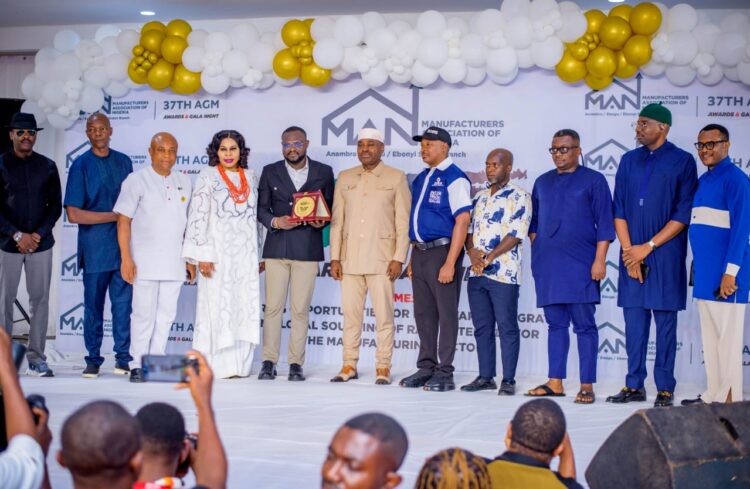
The MD/CEO of John Zobis Group, Mr. John Ezeobi, has again been honoured with another major industry prize in recognition of his contributions to local sourcing, innovation and the growth of Nigeria’s manufacturing capacity.
The prestigious award, “Pillar of Industrial Enterprise and National Impact,” which was conferred on him by the Manufacturers Association of Nigeria (MAN) — Anambra, Ebonyi and Enugu Zone, was presented during the association’s 37th Annual General Meeting, Awards & Gala Night at the International Conference Centre, Enugu.
coming barely three weeks after Ezeobi was nominated as the winner of The Sun’s Industrialist of the Year Award 2025 by the Management of The Sun Newspaper, a run of recognition that has further highlighted his rising profile in the South-East manufacturing ecosystem.
The latest award, it was gathered, celebrates Ezeobi’s deliberate investment in backward integration, his push for local sourcing of raw materials and efforts to strengthen domestic value chains, which MAN described as essential to reducing import dependence and creating jobs across the region.
Chaired by Chief Obinna Iyiegbu (Obi Cubana), the well-attended occasion, themed “Exploring Opportunities for Backward Integration and Local Sourcing of Raw Materials for the Manufacturing Sector,” brought together regulators, policymakers, manufacturers and industry stakeholders and also featured presentations, panel sessions and cultural performances, among other highlights.
Speaking at the event, the Keynote Speaker and Director-General of the Raw Materials Research and Development Council (RMRDC), Prof. Nnanyelugo Ike-Muonso, said the economic benefits of exploring Opportunities for backward integration and local sourcing of raw materials for the Manufacturing sector cannot be overemphasized.
Prof. Ike-Muonso told delegates that Nigeria spent over ₦3.53 trillion importing raw materials in the first half of 2025 alone, warning that such dependence continues to weaken the nation’s economy. He further argued that the proposed 30% Value Addition Bill, which would require a minimum local value addition before export, would be transformational if signed into law.
He also outlined the bill’s potential to expand GDP, generate hundreds of thousands of jobs and save foreign exchange by keeping more of the country’s raw-material wealth in domestic supply chains, boost local manufacturing, and generally reposition Nigeria as a regional industrial hub.
On his own part, the Governor of Enugu State, Dr. Peter Mbah, endorsed the call for stronger industry-academia partnerships and urged financial institutions to make affordable credit available to manufacturers who adopt backward integration. The governor, who was represented by his Deputy, Barrister Ifeanyi Ossai, described the policy pathway as key to moving Nigeria from resource export dependence toward higher-value industrial output.
Reacting via his social handle shortly after receiving the award, the Zobis Cable Boss expressed gratitude for the honour, describing it as a strong motivation to do more in driving local production, reducing import dependence, and strengthening Nigeria’s industrial base.
Ezeobi, who received the plaque from pioneer Nollywood star and legal practitioner, Barr. Kenneth Okonkwo, attested that the AGM provided a critical platform for renewed commitment to backward integration as a pathway to sustainable industrial development.
“The event highlighted the critical importance of backward integration and local sourcing of raw materials as strategic levers for strengthening domestic production, reducing import dependency, and building resilient, self-sustaining industries. A meaningful platform for driving progress and collaboration across Nigeria’s manufacturing sector,” he partly wrote.
Also speaking, the Chairman of MAN for the Anambra-Ebonyi-Enugu zone, Dr. Adaora Chukwudozie, described local sourcing as the pragmatic route to lowering production costs and stabilizing supply chains for SMEs and larger manufacturers alike. She welcomed RMRDC’s roadmap and invited state governments to partner in establishing raw-material corridors and shared processing facilities that would bring inputs closer to factories.
The event, which had His Eminence, Eze Eberechukwu Orji, Eze Aro, as the Royal Father of the Day, was also graced by other notable dignitaries and stakeholders, which include Senator Osita Izunaso, Dr. Gideon Chidiebere Osi, Ichie Sunday Ezeobiora , Chairman, Sunchi Farms; Mr Linus Williams Ifejika, Chairman Blord Group; Otumba Francis Meshioye, National President, Manufacturers Association of Nigeria; Dr. Ifeanyi Okoye, Chairman, Juhel Pharmacy; Chief Dr. Dan Chukwudozie, Chairman,Dozzy Group; Dr. Chike Obidigbo,Chairman, Hardis and Dromedas; Anambra Commissioner for Trade and Industry,Mr. Christian Udechukwu.

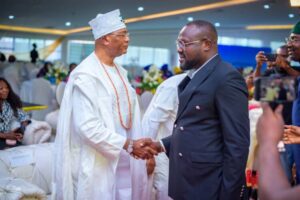
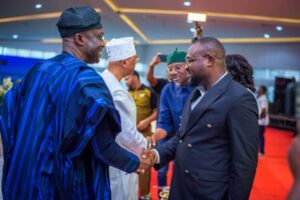




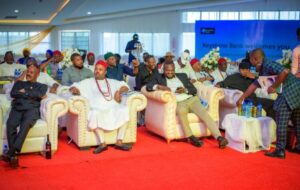

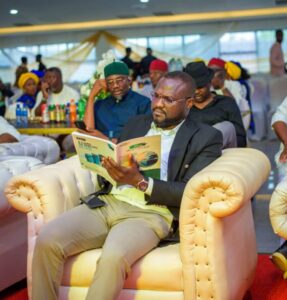

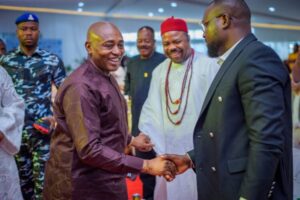


Tech
GLOBACOM SEALS STRATEGIC CONNECTIVITY PARTNERSHIP TO DRIVE IMO STATE’S DIGITAL TRANSFORMATION AGENDA

By Prince Uwalaka Chimaroke
15-NOV-2025
Globacom, one of Nigeria’s leading digital solutions providers, has entered into a groundbreaking Internet connectivity agreement with the Imo State Government through the Ministry of Digital Economy and e-Governance—an ambitious step that signals the state’s commitment to becoming a fully digitized economy and a model Smart City in the South-East.
The agreement, hailed as the largest single fixed Internet connectivity initiative ever undertaken by Globacom’s Enterprise Business Group, underscores the company’s growing influence in deploying world-class telecommunications infrastructure across Nigeria. This milestone partnership positions the operator at the heart of Imo State’s fast-evolving digital future.
Through the deal, Globacom will deliver high-capacity, state-of-the-art Internet infrastructure to strategic government and institutional locations. These include the 15-building Smart City complex in Owerri, the Ministry of Digital Economy and e-Governance, and the Imo State University for Innovation, Science and Technology (formerly Imo State Polytechnic). The infrastructure rollout is expected to strengthen digital literacy, modernize public administration, and enhance access to digital services for residents.
A central component of the project is the integration of the Glo-1 submarine cable—Globacom’s privately owned, trans-Atlantic fibre optic system that links Nigeria directly to Europe. Known for its high bandwidth, ultra-low latency, and secure connectivity, the Glo-1 network will serve as the backbone for Imo State’s digital expansion.
With this partnership, Imo State aims to accelerate e-governance, improve the efficiency of public service delivery, attract technology-driven investments, and promote innovation across sectors including education, commerce, and security.
The collaboration demonstrates a shared vision between the State Government and Globacom: to empower citizens, institutions, and businesses through robust digital infrastructure that can sustain long-term economic growth.
-
Business1 year ago
US court acquits Air Peace boss, slams Mayfield $4000 fine
-

 Trending1 year ago
Trending1 year agoNYA demands release of ‘abducted’ Imo chairman, preaches good governance
-

 Politics1 year ago
Politics1 year agoMexico’s new president causes concern just weeks before the US elections
-

 Politics1 year ago
Politics1 year agoPutin invites 20 world leaders
-

 Politics1 year ago
Politics1 year agoRussia bans imports of agro-products from Kazakhstan after refusal to join BRICS
-
Entertainment1 year ago
Bobrisky falls ill in police custody, rushed to hospital
-
Entertainment1 year ago
Bobrisky transferred from Immigration to FCID, spends night behind bars
-
Education1 year ago
GOVERNOR FUBARA APPOINTS COUNCIL MEMBERS FOR KEN SARO-WIWA POLYTECHNIC BORI









